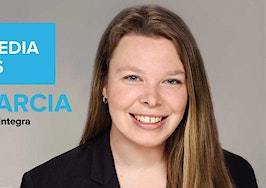When I was in ninth grade, I attended a weekend leadership retreat for girls. Back then, much as I am now, I was chubby, bookish and pretty much the opposite of athletic. I was looking forward to a weekend of seminars, but what I got was outdoor team building, ropes courses and — at the very end — a monumental climbing wall.
You can imagine my excitement.
It was pouring rain and cold. We looked up at this climbing wall that seemed 1,000 meters high. I made up my mind immediately: I could not accomplish this.
Then they told us that, as a group, we had to get every single one of us up that wall before we could finish the day. I promptly volunteered to go last.
I watched as other girls climbed the wall. Some struggled, some made it look easy. Finally, it was my turn. I was terrified. I knew that I would fail.
I started. I slipped. I fell. The group encouraged and cheered me on.
I tried again. Over and over. Finally, I was — miraculously — halfway up the wall. I was exhausted and embarrassed and ready to quit. But I kept going and going. And finally, after what felt like an hour, I made it to the top.
I was shaking like a leaf and crying, but when I stood up, it was the most incredible feeling in the world.
That lesson remains one of the most valuable lessons I have ever learned in my life. Learning is 95 percent encouragement, and only 5 percent information.
I had no idea how I was going to get up that wall. But what I did have was encouragement. And that was the most powerful tool in my toolbox that day.
We all learn in different ways. It’s what makes us unique. Journalist Amanda Lang says, “Your style of thinking, the way you take in information, and how you process it — that is what defines you.”
It’s a simplified way of looking at life, but it’s true. From a very early age, the way we learn defines us.
A child learns by asking “Why?” Sometimes incessantly. The trouble is, “why” is not a welcome word in our world. We often raise children to believe that curiosity is negative, wrong answers mean failure, and asking too many questions is annoying.
As we get older and enter the workforce, we find that most companies don’t encourage “why,” either. So they stick to “This is how we’ve always done it” — which is pretty much the opposite of why. And so we stop asking why, and often turn into disengaged adults, which keeps us from being teachers, leaders and, most of all, perpetual learners.
“Why” is powerful. The biggest impediment to real innovation, real learning and real teaching is us. I believe we have a responsibility to teach others, and in teaching, we also learn. We become better.
In our industry, we are not salespeople. Our sole purpose is to educate our customers, our colleagues and our teams. We need to be generous with our knowledge, passion and experiences.
Too many of us go around holding that all inside. It’s a cancer in our business, and it’s the reason that — as an industry — we are getting older and less innovative.
We say that the MLS, syndication and technology are affecting the industry — some say adversely. But the real danger to our industry is us. If we don’t start learning more and teaching more, we real estate professionals will become extinct.
American philosopher John Dewey (1859-1952) said, “We do not learn from experience; we learn from reflecting on experience.” The lesson I learned that day at the climbing wall is nothing compared to what I have learned in the years since by reflecting back on it.
The lessons you have learned throughout the course of your career have deepened and compounded over time and become the reason you are who you are. You are, in essence, a giant wad of all the lessons you have ever learned.
And there is a significant difference in the way that successful people learn versus the way unsuccessful people learn.
Successful people talk about ideas. They explore new ways to think about a problem and have the humility to admit that they might not have all the answers. This quality allows them to be continually improving.
Unsuccessful people hoard information and data. They keep their ideas to themselves, thinking that it’s better to take all the credit for their efforts. This kind of behavior is isolating and prevents them from developing their ideas to full potential.
Successful people embrace change. They don’t cling to old ways of doing things. This is not to say that they aren’t afraid of change; change is scary. But by embracing it, they allow themselves to learn from past mistakes.
Unsuccessful people operate from a transactional perspective. They tend to focus on the one task that is in front of them rather on the bigger picture. A narrower approach allows them to stay in control but sometimes keeps them from considering other options.
Although it’s not always easy, successful people compliment others. This lesson can be one of the toughest. But making it a practice and seeking out the positive can completely change the way we look at the world around us.
Unsuccessful people don’t set goals. They often fly by the seat of their pants and hope. Hope is a beautiful attribute, but it’s not a strategy, and it usually doesn’t get you far when times get tough. Hope is only effective when it’s paired with action.
I think that one of my least favorite misconceptions about learning is that it’s a race. Glennon Melton, author of “Carry On, Warrior,” says, “Erase the idea that education is a race. Education is like Christmas. We are all just opening our gifts, one at a time.”
We don’t all have to learn at the same pace, or even be learning the same things. But we should all strive to be perpetual learners.
One of the best ways to be a learner is to teach. But, y’all — teaching is hard work. That’s because we don’t get to choose our students or even who is on that climbing wall with us. We have to encourage and be encouraged by people who sometimes we just plain don’t like.
CEO of Prince George’s County Public Schools, Dr. Kevin Maxwell, says this about teaching: “Our job is to teach the students we have. Not the ones we would like to have. Not the ones we used to have. The ones we have right now. All of them.”
And the problem is this: We usually go about this teaching thing all wrong. We use a mirror, instead of a lifeboat.
Teaching with a mirror is telling people what is wrong — making them face the “wrong” in the mirror. We screenshot examples and whisper loudly and shake our heads. Many teachers, trainers, coaches and normal people use this method all the time.
In real estate, we use it on our clients (“Clearly you need a stager”); on our colleagues (“Can you believe what they did?”); and on ourselves (“You totally screwed up that listing appointment”).
The mirror method is a part of learning and teaching. But, it’s not the only part — we can’t stop there. We have to have a lifeboat. It’s the act of asking, “How can we improve?” It’s offering a solution to a problem, rather than just calling it out.
I think back to the climbing wall. My problem was that I “knew” that the task was impossible. But it wasn’t the task; it was the way I thought about it.
And it wasn’t enough for my teammates to show me a mirror. They had to encourage me and offer me solutions. Even if the solution was simply saying, “One more step, one more reach.”
As we go about our days, we need to remember our responsibility to be learning and teaching. To remain innovative, open-minded and willing to try. To take our giant wads of experiences and pass them on to others, especially those who are new to the business or entering the world of homeownership for the first time.
Learning is 95 percent encouragement and only 5 percent information.
It’s not enough to just have a mirror. We need the lifeboat, too.
How are you passing your knowledge on to others? Please continue the conversation in the comments section below.
Valerie Garcia is a corporate trainer and international speaker specializing in real estate.







